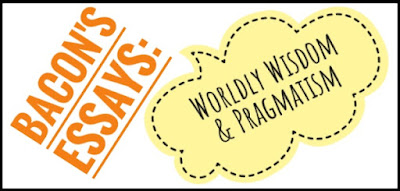There
is nothing to dispute that the essays of Bacon are full of worldly wisdom, practical thinking and pragmatic values and therefore they constitute a handbook of
practical wisdom. Worldly wisdom refers to the kind of wisdom that is required for achieving
worldly success. Bacon is clearly seen in his essays both as a philosopher and
a moralist. A philosopher is deeply interested in the pursuit of truth and a
moralist is a person who teaches human beings differentiate between the right
and the wrong and urges them to undergo the right path only. Bacon is found in
this dual role in many of his essays.
The essay ‘Of Great Place’
contains a large number of moral precepts but these moral precepts, it is noted, are synonymous with worldly wisdom.
Bacon says that a man attaining a high position loses his freedom. Men in high
positions, he observes rightly, are happy only when they hear that other men
think well of that and that other men envy them for the offices they hold.
Bacon says
“In place there is license to do
good and evil; whereof the latter is a curse: for in evil the best condition is
not to will; the second, not to can.”
The
purpose of a man’s efforts should be to perform noble and meritorious tasks.
Bacon observes that there are
four vices of authority that should be
avoided – delays, corruption, roughness and facility. A servant or a favourite should not be allowed
to get too intimate because others may suspect him an agent through whom one
receives bribes. A man in high position should think a number of times before
making promises. If he cannot keep the promise he has made, his reputation will
go down, and his enemies will get chance to talk against him.
Wisdom
in Bacon’s essay,
“Of Marriage and Single Life” does not refer to the profound or philosophical
variety. Rather it offers worldly wisdom which, to a great extent, is cynical.
Bacon’s cynical approach is expressed in the very opening sentence of this
essay - Bacon expresses the view that a married man with children can not
undertake great efforts: “He that hath wife and children hath given hostage to
fortune.” He continues opining that “The best works and / of greatest merit for
the public have proceeded from the unmarried or childless men.” However such
notion is not certainly true to the general context.
In the essay “Of Parents and
Children”, Bacon observes that parents
must not have discrimination among their several children. Parents should
not be miser in fixing the pocket allowance for their children. If the children
receive too shall a pocket allowance, they will associate with mean companions
and will learn all kinds of tricks and dishonest practices.
In the essay “Of Studies”, Bacon
offers some practical wisdom regarding
studies. Studies develop and perfect a man’s natural ability and they are
in turn enriched by practical experience. Only bookish knowledge or only
practical knowledge cannot help one. One should have both. Studies might give
one guideline. But experience and practical knowledge are something that one
should apply in one’s life. There are some books which are to be read only few
parts. There are some books that should be read quickly. There are only a small
number of books that deserve to be read thoroughly and closely. Thus only a
small number of books provide the knowledge and wisdom that are to be imbibed
and made a permanent part of oneself. Bacon says, “Reading maketh a full man;
conference a ready man; and writing an exact man.”
In the essay “Of Love”, Bacon
offers a practical analysis of love.
He says that a man should stay away from passion of love. A passionate lover is
likely to lose not only other things but also love. A man should restrain himself
from excessive love and keep it within limits. He should not let his love interfere
with his life. Dissolute or immoral love has corrupting and deserting effects
upon human beings, though love is essential for the welfare of human.
In the essay “Of Friendship”,
Bacon makes a pure worldly approach to
friendship. He analyzes the uses of friendship. A friend can give reliable
advice and alternative suggestions. It is better to consult the same man in all
matters but he should be a wise and sincere friend. A friend can speak or act
on our behalf where we ourselves cannot speak or act.
This note is written by Md. Intisher Chowdhury Sherbin
You may also like

Hey, how do you make these categories on your blog? ..like "Linguistics", "short-stories", "Prose" ..-
ReplyDeleteI can help you Nova.
ReplyDeletegood effort,,,thanks a lot
ReplyDelete